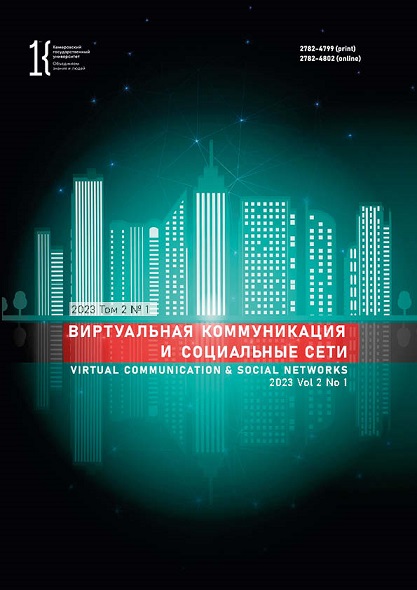Tomsk, Russian Federation
Tomsk, Russian Federation
The role of the addressee in mass media communication is becoming more active, thus restructuring the functional discourse parameters. This change has also affected institutional psychological practice on the radio and in social nets. The sender and the addressee share the same value orientations in their professional interaction and phatic communication. The present research featured the psychological practice in the media discourse that belongs to psychologist M. Labkovskiy and his followers on the radio and Instagram . Based on the communicative-discursive analysis, the authors revealed the communicative models of their interdiscursive interaction. These models shared the same values and focused on attracting and retaining the attention of the audience. As a result, the discourse needs a new genre system, as well as communicative and linguistic tools. The main results of these changes are manifested in the phatic component of communication and in the ways the discourse agents position themselves.
discourse, media, massmedia, subject of discourse, agent, client, author, interperconal discourse, discursive practice, institutional discourse
1. Beylinson L. S. The professional discourse: principles, functions, and norms. Dr. Philol. Sci. Diss. Abstr. Volgograd, 2009, 40. (In Russ.)
2. Dejk T.A. Discourse and power: Representation of dominance in the language and communication. Moscow: Librokom, 2013, 344. (In Russ.)
3. Karasik V. V. The structure of the institutional discourse. The Problems of the Speech Communication. Saratov: Saratov University Press, 2000, 25-33. (In Russ.)
4. Labkovskiy M. I want and I will. Accept yourself, love life and become happy. Moscow: Al`pina Pablisher, 2020, 320. (In Russ.)
5. Matison D. Discourse of media. The analysis of media texts. The research of media and culture. Kharkov: Gumanitarniy Centre, 2017, 264. (In Russ.)
6. Silantyev I. V. The text in the system discursive interactions. Novosibirsk: NSU, 2004, 188. (In Russ.)
7. Shmeleva T. V. The model of speech genre. Zanry Reci, 1997, (1): 88-98. (In Russ.)
8. Clark H. On Stochastic Grammar. Language, 2005, (81): 23-56.
9. Pickering M. J. Automaticity in Language Production in Monologue and Dialogue. Automaticity and Control in Language Processing. Hove: Psychology Press, 2007, 20.















